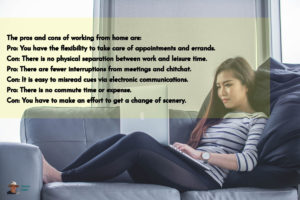WORKING FROM HOME MAY sound like an ideal situation – especially if you’ve never done it before. What could be better than simply rolling out of bed and arriving at your home office in moments without the hassles of first making yourself presentable and then commuting to a workplace with a boss and colleagues who may drive you crazy?
In reality, though, like working in an office, remote work comes with pros and cons. To explore both the benefits of working from home and the drawbacks, I conducted informal interviews with more than 100 people with remote working jobs. Below are some of the top themes that emerged about remote workers’ favorite aspects of telecommuting and the challenges of a work-from-home lifestyle.
The pros and cons of working from home are:
Pro: You have the flexibility to take care of appointments and errands.
Con: There is no physical separation between work and leisure time.
Pro: There are fewer interruptions from meetings and chitchat.
Con: It is easy to misread cues via electronic communications.
Pro: There is no commute time or expense.
Con: You have to make an effort to get a change of scenery.
Pro: You have the flexibility to take care of appointments and errands.
One of the hardest things about committing to a 9-to-5 desk job is that it prevents you from being able to handle almost anything else that comes up in your life, whether attending a routine dentist appointment or picking a sick kid up from school. When you work from home, while you still have to meet your deadlines and be available when you say you will be, you generally have wider bandwidth to tend to other responsibilities without jeopardizing your job.
Con: There is no physical separation between work and leisure time.
Many who work from home lamented that they often find themselves working around the clock since their labor has no definite start or end times. As a result, they sometimes feel like they are always at work, making it challenging to shift to the post-work relaxation mode that many office workers take for granted.
Pro: There are fewer interruptions from meetings and chitchat.
It’s easier to get into a flow state of deep work when you’re in your home office without colleagues dropping by and sitting down impromptu to talk about their weekends. Limiting unnecessary interruptions from your colleagues and boss is a big plus of working from home and is one reason why many remote workers are more productive than office-based workers. While you may need to dial in for specific meetings, you’ll likely get a break from attending several others – many of which may be unnecessary to your role – that confront staff workers daily.
Con: It is easy to misread cues via electronic communications.
While few who work from home expressed feeling “lonely” as is typically assumed, many pointed to the difficulty of getting the tone right in digital communication systems, such as email, chat, social media, and text.
Pro: There is no commute time or expense.
Forget about rising petrol/gas prices. Leave your car in the garage. If you would normally commute by bus or train. Retire those ticket expenses.
Con: You have to make an effort to get a change of scenery.
All work and no play makes a “stay-at-home worker” a dull person. It’s time to schedule some “down” time. Join a sports team, get to the gym or set up a regular “date night” with your partner. Better still do them all.
Thanks for reading
Steven Smith

